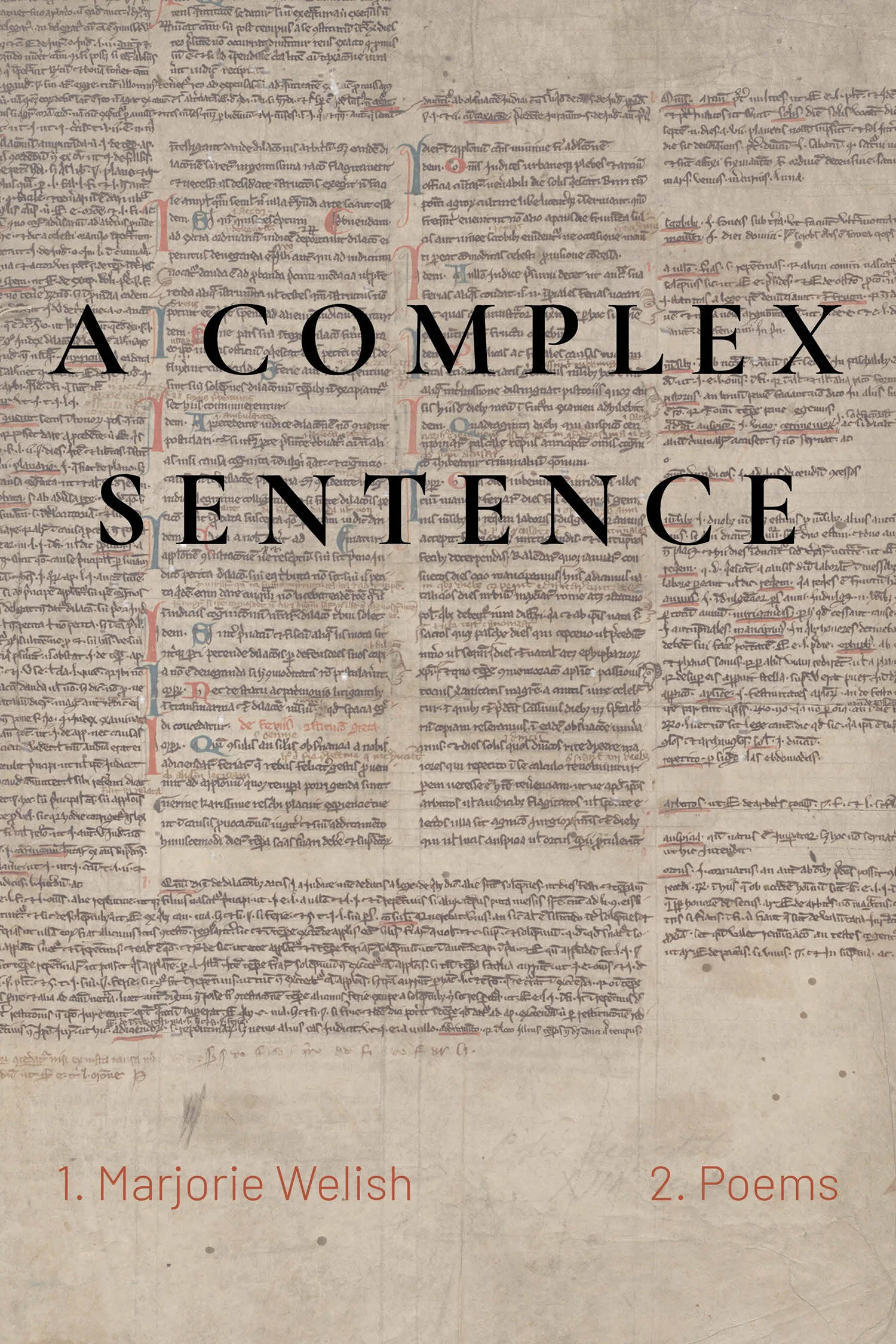Reviewed by Anne Graue
In Marjorie Welish's most recent poetry collection, A Complex Sentence, meaning is fluid, and differences are embraced; language is dissected, and omission is celebrated. The poems contain language that relies on dissimilarities in perspective and vision and offer signals to what is left out or discarded as well as what has made it to the page. In writing, as in art, Welish focuses on what is important in a single unit, in this case the sentence; she further complicates the definition of a complex sentence with meticulously crafted discordant lines and stanzas that reveal signs and symbols in intricately woven prose and multifaceted poetic lines.
The language of the poems in this collection demands understanding and concentration on values beyond what people may think poetry or art is or should be as well as consideration of possibilities of thought and sense beyond the lyric or the narrative. In the opening poem, "Itself," readers are introduced to a view of language that many may not have previously considered. The centered opening lines offer a hint of definition: "Sedentary in another language is language as such / Whether or not we can read it, sought / Because home." This is an indication that language exists whether or not anyone is around to hear it, and thought exists whether or not it is ever spoken or written. In a semiotic world of signs and symbols, this makes perfect sense. The following exploration of language—its grammar, structure, and syntax—is a linguistic journey through art and poetics that places itself on a continuum of meaning and significance.
In her essay "What is Black and White and Read All Over?," Welish has said, "Incommensurate logics brought into equilibrium are of great interest to me, in part to further the concerns of modern abstraction by opening the givens of modernism to post-structuralist investigations." While she was writing about art, these post-structuralist investigations can also be applied to language and poetry, in its own way a place for linguistic adventure and risk, which she explores through the poems in this collection. Poems such as "In Recital" and "Skywatching" that appear in the early pages deconstruct sound and time in such a way that illustrates their subjectivity and non-linear qualities. In the former, observation is questioned and even "Deleted / Noncompliant." In the latter, time is constrictive "as when past is prologue" and "Yesterday's long exposure / turns its back on / tomorrow." Disregarding the familiar as "auld lang syne's incessant / habitual moviegoing" and arguing for a return to the past that is not so icy, "Skywatching" is a poem that seems to argue for a type of elusive normalcy. Both poems unglue cohesion to form new meaning.
Ferdinand de Saussure, in his 1916 Course in General Linguistics, said that "The signs used in writing are arbitrary" and ". . . in language there are only differences." He also said, "Arbitrary and differential are two correlative qualities." Saussure's statements shed some light on the meanings inherent in Welish's collection, specifically with regards to poem placement and order as well as word choice and syntax. The poems are ordered in a way that illuminates a progression in understanding and discovery of how language can be used as art on the page. This ordering also presents a linguistic study of the use of words and the structure of sentences, complicated by the consideration of the poetic line, stanza, and form. "Backtalk" and "Backtracking" are two poems that both exemplify this aspect of placement complementing meaning. As the poems sit on facing pages, they do not mirror one another but interact linguistically, one directing the reader back to the other to ruminate in an echoless canyon. Welish uses ALL CAPS, italics, spaces between words, and minimal punctuation to talk about semiotics, poetics, and authorship. The arbitrary acts of "WRITING" and "NOT-WRITING" are in one sense "A time to reap valor and sorrow." In another sense, these acts are meaningful leaps that distill the "Hours minutes seconds" rewriting the book inside out.
The title poem of the collection begins with the line "The less labor, the more spur," and this becomes the poem's motif in examining what is involved in the creation of any written manuscript when writers are faced with the considerations of conventions, grammar, syntax, technology, and the blank page. Something has been lost in the transmission of ideas where "Ease has its consequences in facility." In a moment of prose within the poem the speaker explains: "An editor tells me that since the advent of computer technologies, fiction manuscripts have increased in length, by twice at least, as writers have no incentive to be economical in thought." With the use of technology that is supposed to make life easier, the writing process has been somehow cast aside in favor of the "profligate" and "prolix" manuscript produced "in a screen's dim glare." Organized into two sections that explore the wonders and obstacles inherent in technology for writers, musicians, and artists, this poem anchors a collection that engages and encourages ideas about how environment, knowledge, and tools influence what is created.
Walking through a gallery show of any artist, it is often necessary to see each piece as an individual statement while simultaneously considering it as part of a larger conversation engaged with the other pieces on exhibit as well as with the canon and the art world. Welish's poetry collection also asks this of its readers; each poem is a created world within a larger space where all of the worlds speak to one another. What emerges is a new doctrine that is "A cause for wonder / is this mind in zeros and ones adding to inestimable cultural magnitude. . . " which is ". . . possessed of detritus the lost." In it, we find "like new the page in grace" where new art and creativity are possible.

